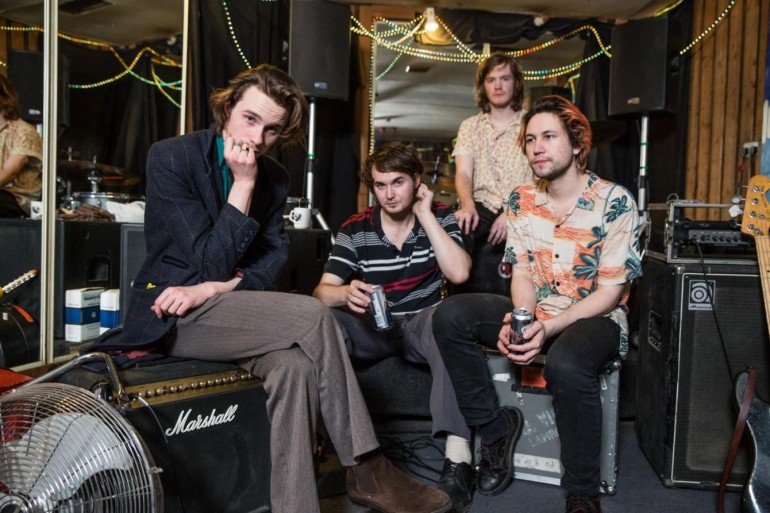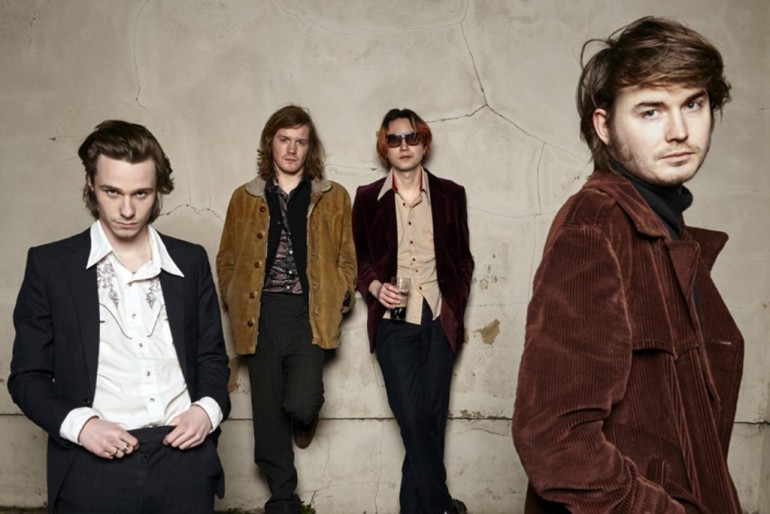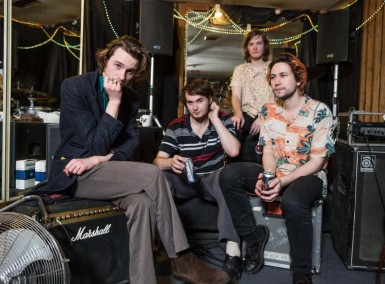
Photo by Emma Swann
The story of PALMA VIOLETS’ rise to prominence seems to belong to a different time. Unlike a lot of modern bands who spend months painstakingly tending a Soundcloud or Bandcamp account, they (Will Doyle (drums), Pete Mayhew (keyboards), Sam Fryer (vocals/guitar), Chilli Jesson (bass/vocals)) brought attention to their music simply by gigging, frequently and wildly. The band spent most of 2012 cramming people into their studio/venue/HQ Studio 180, an art space in Lambeth in London, for sweaty, chaotic shows that eventually drew the attention of Rough Trade records, who promptly grabbed the band’s signatures. Their first single, Best Of Friends, won them NME’s track of the year for 2012, and they also found themselves on BBC’s Sound Of 2013 list. The pressure was on for their debut album, but 180 lived up to expectations, a record loaded with rattling, hyperactive indie anthems. But having crossed the first hurdle, the Palmas are facing equal levels of expectation ahead of album number two. Entitled Danger in the Club, it’s out on May the 4th on Rough Trade. NOTHING BUT HOPE AND PASSION phoned up keyboard player Mayhew ahead of the album’s release… with a little help from Sam as well.
Hi guys, where do you find yourselves today, and what are you up to?
We’re in Berlin and we’re doing a lot of interviews.
Are you getting to see any of the city around the interviews, or is it a pretty media-heavy day?
Nah, not at all. We left the hotel once, but that was just to go to a radio station.
So it’s been two years since the release of 180, what have those two years been like? What’s changed in the world of the Palmas?
It’s rather hectic. Lot of moving about, lot of mucking about, and some beautiful friendships made along the way.
With 180 it was recorded pretty quickly, it was essentially getting your live set down on tape. So with the new album, Danger In The Club, it seems much more planned out, much more of a ‘studio album’. You took yourselves out of London and out of Studio 180 to record it. So how does that change the process?
Well, there was a lot more thought put into it, a lot more time. Loads and loads of money. It was more properly produced, because we did it with a proper, proper producer this time. Yeah, I think the whole process of it was more… mature I suppose.
And in the early days of 180, you guys put yourselves forward as very raw musicians. You were kind of advocating a kind of, ‘Just get up and fucking do it’ approach to musicianship, rather than being stale and perfectionist. But now you’ve had another two years of playing together, of touring together, of being a band, and you’re much more musically experienced now. So how does that affect that approach to writing and performing new music?
Nah, we’re still just as bad as we were two years ago. Two years has done nothing for us. In fact, I think we’re slightly worse than we were before.
The thing that always strikes me about PALMA VIOLETS‘ songs, is that they’re really loaded with energy and breakneck momentum, and that’s continued on the new album with Gout! Gang! Go! and Secrets of America. So when you want to write a song with that kind of really fast energy, how do you get that into your writing? Do you record in live takes, or do you get things written and recorded as quickly as possible to try and keep that momentum?
I think it’s a bit of both really. You don’t want to do too many takes, and you want to keep things going quickly and swiftly. A sort of combination of the two really.
Because I read that English Tongue, the last song on the new album, was written in a day?
Well, we didn’t write it in a day, but we did record it quite quickly, after we thought we’d finished everything. So that was a later edition.
So that must keep the energy levels up if you’re getting it recorded and mixed that quickly?
Well, we weren’t actually intending on putting it in the album. We just recorded it, and then a couple of people from the label came down and said ‘Ah, that’s a hit! You need to sell more records, yeah!’ And they just put it on the record. Good fun though.

When you guys broke through first, there was an absolute media storm about you. Your first single Best Of Friends won NME’s Track Of The Year, before your album had even come out, and every article written about you had BIG NEW THING written on it in massive letters. Now you’re starting the press cycle for album two in a more established position. Does that appeal more to you than being in the middle of the new band hype?
Well, again, it’s a bit of both really. It’s nice to be established, knowing that you’ve gotten somewhere. You don’t have the anxiety of thinking, ‘Am I gonna get there?’. It’s good, it’s nice to move on actually. There’s no nostalgia at all actually. We’re happy to move on.
Because people are quite cynical towards new bands sometimes. So it must be nice to move beyond that.
Yeah, I think everyone saw through it (the hype). People did hype up the hype, it was alright. People got over it.
You’ve also made a point of adding this kind of old school, British pub culture aesthetic into your image. It’s there in your press shots, the album opens with a snippet of Sweet Violets (traditional rhyming song, recorded by several artists). What attracts you guys to that culture and imagery?
I think it all comes naturally I suppose. There was never a decision to go for it, it’s just being very honest I think. That’s just what comes across.
In a lot of your songs, there’s a certain kind of looseness about them. You’ve got an ability to swerve through stylistic changes within a song. It was on the last album with Last of the Summer Wine, which has this build-up, then a chorus pops up out of nowhere, and then it has the cool, blurred fade out. And Danger in The Club is similar as well, it goes through several phases as a song. What’s it like getting that looseness about style into the writing process?
I think it’s just because, Sam (Fryer) may agree, writing three verses is quite hard. It’s quite monotonous; you just want to put something else in, so there’s always just more than two things going on in the song. [Sam interjects with Pete out of earshot]. Have we got three verses in a song? No actually, we do have three verses in a few songs.
What are your hopes for Danger In The Club? Where do you want this album to put you?
Somewhere between U2 and FOO FOGHTERS, maybe?
That would be good. Could you see yourselves going for their lifestyle?
Yeah, possibly. That’d be great.
And for the fans of 180, the people who listened to it and went out and bought it, what would you say separates 180 and Danger in the Club?
Umm… [consults Sam]. Sam, what would you say separates 180 and Danger In The Club? … Bigger sounding drums.
—



